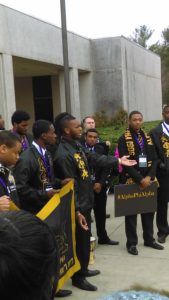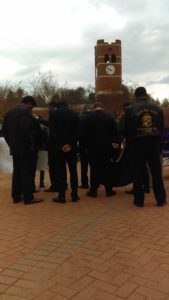
Alpha Phi Alpha brother Prince Collins Jr. addresses march participants in front of the H.F. Robinson building during the MLK Unity March on Jan. 16. Photo courtesy of Caleb Peek.
“Speak up! Be heard!”
Addressing a growing crowd gathering in the Western Carolina University courtyard on Jan.16, senior Norman Falls implored those around him to raise their voices in boldness.
“No justice, no peace!”
Over 100 voices answered his call. Now they were louder, intensity rising with each iteration of the battle-stained slogan. They wore placards bearing the faces of minorities who perished at the hands of the system. As the .7 mile march began they were chanting, not angrily, but in an invitingly insisting meter similar to the cadence of Dr. King himself.
The 2017 Unity March, hosted by WCU’s Nu Zeta chapter of the Alpha Phi Alpha, Inc. fraternity, officially kicked off five days of on-campus events and activities celebrating the legacy of civil rights icon Martin Luther King Jr.
The week of celebration, sponsored by the WCU Intercultural Affairs department will feature a number of cultural events throughout the week, including an African dance show and an appearance by storied football coach Herman Boone, portrayed by Denzel Washington in the film “Remember the Titans.”
For an event that normally acts as a gateway to alternative experiences, this year’s Unity March seemed to serve a larger purpose. A palpable sense of urgency among the racial melting pot of marchers conveyed a clear message: in the face of worsening race relations across the nation, this year’s march was especially necessary.
WCU Dean of Students, Kevin Koett, is no stranger to demonstration; he’s served his fair share of time on picket lines of the past. From his viewpoint as a university authority, Koett has dealt first-hand with the social problems associated with close-quarter campus living. He advocates that any progress against stereotypes and prejudices is much-needed in a progressively divided society.
“I love seeing members of the community, faculty, staff, {and} students all coming together,” said Koett. “So we take small steps. Certainly not going to change anything overnight, but there’s some nice diversity in the group, whether it’s ethnicity, age, gender or position at the institution. So I think that’s a sign of encouragement and a sign that we {the institution} is making progress.”
After Norman Falls had rallied the marchers, he could be found near the front of the pack leading the demonstration with his Alpha Phi Alpha brothers. Falls called the event a “march of peace,” referring to the student body as a diverse, yet solidified community.

Members of the Alpha Phi Alpha fraternity bow their heads in prayer prior to the Unity March on Jan. 16. Photo courtesy of Caleb Peek.
“We {all} go through a lot of stuff,” Falls said. “But then, we’re one community, one voice, and we’re all going to be heard together… There’s a lot of things going on right now. Lot of things with gay rights, women’s issues. So there’s a lot going on, but at the end of the day, justice will be done.”
Only steps behind the front line, senior Alexis Welch linked arms in solidarity with three of her peers. An African-American like Falls, Welch cited last year’s on-campus racial tension that resulted from an angry Facebook post directed toward the department of Intercultural Affairs as a signpost of change.
That time, weeks of protests and “chalkings” in high-traffic areas around campus ensued. This year, Welch wants to use the annual demonstration as a way to move the student body forward together, while pushing prejudice into the past.
“Last semester and the semester before, we had a lot of racial issues going on {around campus},” Welch said. “And I think this just helps everyone to understand that we’re more than our skin color. We’re all human, so let’s just come together and love one another.”


